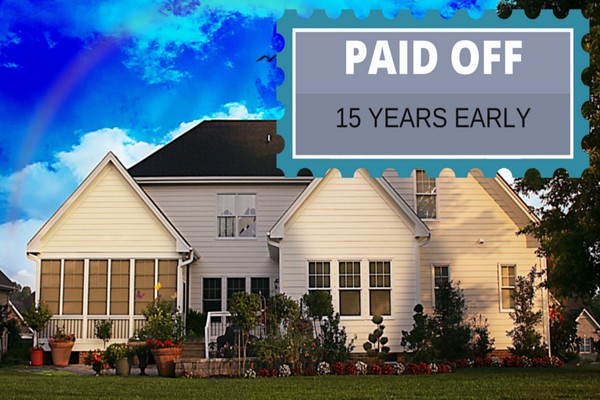 Most people close to their retirement (or even otherwise) tend to have their sights set on two of the most important financial goals for any individual.
Most people close to their retirement (or even otherwise) tend to have their sights set on two of the most important financial goals for any individual.
While the first is a very obvious retirement account, the second revolves around paying off the house mortgage as early as possible.
The incentive in paying off bills as big as a mortgage payment earlier is immense.
For starters, the monthly expenditures after paying off the mortgage become astoundingly low, which opens up yet another money saving avenue.
Table of Contents
How We Are Paying off Our 30-Year Mortgage in 15
We bought our house a little over 7 years ago.
We got a 30-year mortgage, but we will have the house paid off in about another 6-7 years.
💸 FreeCash: Earn up to $497 per task playing games, testing apps & doing quick surveys. It’s free money—grab your spot today! Claim Your Cash
✅ Earn Haus: They’re paying up to $25 per survey—and you get paid the same day. PayPal, Venmo, or check. Get Paid Now
📺 InboxDollars: Watch videos, shop, take surveys—get paid for stuff you already do. $5 bonus just for signing up. Grab $5 Bonus
🚀 KingOpinion: Earn up to $8 per survey sharing your opinion — superfast signup, payout via PayPal or gift cards. Try KingOpinion Now!
🔥 Swagbucks: Over $900M paid out. Sign up now and grab $10 free—then earn more watching videos, taking surveys & more. Snag $10 Free
How did we do it?…
We simply paid a little extra every month.
And by extra, I don’t mean a thousand dollars every month.
No, just a few hundred.
Whatever we could afford that month. Some months we paid a hundred bucks extra, some months two hundred, and some months five hundred.
We just made sure we paid something extra and not just the minimum payment.
It works because as you can know, most of what we pay is interest. So, when you first begin paying your mortgage payments, out of, say, a $1200 payment, probably around a $1000 goes to the interest. As you go on making your monthly payments, the amount of money you owe becomes less and less, thus the amount you pay for interest lowers.
So, with some calculation, we realized that by paying extra few hundred a month, we could go from having $1000 out of our $1200 monthly payment going straight to the interest rate, to lowering that number to a few hundred in just a few years.
It’s simple math, the less of your monthly payment goes to the interest the more of it goes towards the principal, which means you get to pay off your mortgage faster.
5 Ways to Pay off Your Mortgage Faster
Below explained are some strategies to help you close your mortgage early without disrupting existing finances.
Advertisements
1. Opting for a Short Term Loan Refinance
This is considered to be among the most effective ways to ease out your mortgage earlier than normal. You can simply refinance your existing loan to one with a shorter period of repayment.
For example, if your current mortgage is 5 years old with another 15 years to go, you can refinance it to a new 5-year term. In one go, you would’ve cut the repayment period by 10 years.
You will find this method friendlier if you don’t have financial discipline, which is something very necessary with some of the other mortgage pre-paying strategies.
You’ll also need to make higher payments every month because of the new fixed loan amount, which means your loan will retire sooner than you originally planned for.
That said, there are two very glaring negatives with refinancing:
- Firstly, paying off the mortgage earlier than originally agreed upon usually incurs payment of closing costs.
- Secondly, refinancing doesn’t add up mathematically if the existing rate is higher than your original one.
Refinancing will be a bad idea even if the interest rate will only be marginally higher than the one you are already paying. Refinancing thrives best when rates are stable. In case it’s not, other options should be considered.
2. Add a Fixed Monthly Amount to Your Regular Mortgage Payments
This is by far the most straightforward way to close off your mortgage early. You already pay a monthly sum towards your mortgage, so all you need to do is add a fixed amount to that monthly payment.
This extra payment should be within your means and if ever a crunch crops up, you can resort to paying the original monthly amount.
Let’s do the math now. Say you’ve taken out a $500,000 mortgage for a period of 20 years at roughly 5%. That equates to a monthly payment of $3,300 with the tenure running up to 2033. However, by adding even $200 to that amount, your mortgage can be wrapped up a year earlier.
Of course, for a lower principal with a longer repayment period, even more years can be shaved off the normal mortgage period.
There are a number of possibilities you can explore using any mortgage amortization calculator. It’ll help you decide on the right amount of extra money your current finances permit towards increasing the monthly mortgage payments.
3. Include an Extra Payment Every Year
Adopting a biweekly mortgage repayment is another method to curtail the duration of your mortgage.
As for your lender allowing it, they might either ask you to refinance your existing mortgage to one with biweekly payments or might even allow setting up of this plan on the prevailing loan.
However, the benefit of biweekly mortgage payments can also be obtained in another way. The main advantage with biweekly mortgage payments is that you make an extra month’s payment for the year. This advantage can be ported to your regular mortgage by literally making an entire extra month’s mortgage repayment for the year.
The numbers behind this theory are fairly simple.
For example, with the biweekly system, you’ll be making 26 payments in a year. Divide this figure by two and you have 13 monthly payments for the year. Now, instead of paying biweekly, you can choose to pay that extra 13th installment of your loan.
By making an extra month’s payment ($3,300, from above example) every year, you can reduce your mortgage’s term by close to two full years.
4. Pay off in Lump Sums
This method works for people who lack the financial discipline to fork out an extra monthly payment throughout their repayment period. Paying off in a lump sum or chunks is also a good idea as most people tend to generate extra cash from time to time.
Now, this money would be better used if it’s spent on prepaying your mortgage instead of other purposes with the end result being a shorter mortgage period.
One of the sources you can use for such a prepayment is the tax refund. On average, the US tax refund for a person amounts to $3000. Now if you can direct this refund towards your mortgage repayment every year, you would have shortened your loan period by almost two years.
The best part is you would have done this without opting for any refinancing or even adding extra principal payments every month.
5. Use the “Sinking Fund” Model
People who are habituated and comfortable with saving money should find this method to their liking.
This method involves setting up of a special savings account with the sole aim of prepaying the mortgage early. Your savings account will see monthly contributions till the time it’s sufficient enough to prepay your mortgage entirely.
This method is known as sinking fund and many institutions and businesses follow it worldwide to retire their bond issues.
Two principal benefits of this method are:
- It enables you to take full advantage of the tax deductions offered under mortgage interest payments.
- It gives you complete control of all the money before you actually pay off the mortgage. This helps you deal with contingencies and emergencies in a better way.
Is It Even Smart to Pay down Your Mortgage Early?
There are some people who say “not so fast, paying off your mortgage early is not a good move at all”. The argument here is that by investing that extra money that you are going to use to pay off your loan faster you will be able to get a much better and higher return.
My argument here is that sure, you may be able to grow your money by investing into something worthwhile, but at the same time, there is also a chance that you may not, not to mention, not everybody is a professional investor, so you may even risk losing your money.
So I say if you wanna play it safe, playing off your mortgage is a much safer investment with much better results. I mean, why would you leave a guaranteed saving of 5%-6% (or whatever your interest rate is) from paying your loan sooner, and go for the possibility of a higher return by investing!
The Bottom line
All these strategies have their own virtues.
With a little bit of planning and some calculations, you can apply at least one among these strategies to your situation.
And hopefully, have your house mortgage paid off earlier, saving yourself tens of thousands of dollars in the process.




Share your thoughts